- Home
- Dusty Richards
Massacre at Whip Station Page 12
Massacre at Whip Station Read online
Page 12
“I agree with you there,” Crane said. “Look at our new taskmasters.”
“That’s right,” Peterson said. “Look at those louts. So what’s left to be a cause? Anger at the North? Violence against Negroes that will bring violence against us?”
“Honor,” Crane said.
“Ah,” Peterson remarked. “One of the four horsemen that brought this hell on us all.” The doctor shook his head. “I had honor, purpose, dignity, and good intentions when my wife took my children and went to live with her folks in Florida. If I’d spent those four years with her, accepting what was and starting a new life, instead of trying to save lives, I wouldn’t—as you put it, and you’re right—be such a naysayer.”
Crane made a disapproving sound. “I can’t agree with you, Doc. Ideas and values are worth fighting for, regardless of your numbers.”
“Or whether you’re alive to benefit?”
“That’s right,” Crane said.
“There’s a word for that,” Peterson said. “It’s ‘martyr.’ Debating, discussing, yes. Dying? Losing an arm or both eyes or a loved one? That’s a price too steep for something that can’t be touched or held or smiled at.”
“Not to some,” Crane replied.
Peterson sighed. “Well, maybe you’re right. But out here, all I see is a pack of animals destroying, not building or even rebuilding. Silas Welch is out there, somewhere. You don’t bury a dead body, my friend, and all you get are maggots and disease.”
Crane had forgotten about his companion. He deflated somewhat. He had also forgotten the food Ridgewood had left for him and began eating. He inhaled painfully, adjusted the way he was sitting so he was straight against the rock wall. Then he exhaled.
“I guess nothing’s easy, ever,” Crane said. “But if you can’t live with yourself nothing’s even possible. I like what I’m doing out here. I like the country. I like my saddle mates. If I can’t have what I left, this is the next best thing to me. This life.”
“I can’t argue with you about the place,” Peterson agreed. “I just wish we didn’t have to kill people to live in it.”
“We tried that, with the Butterfield horse,” Crane reminded him. “Didn’t work out. Shoulda shot the driver, then Silas’d still be alive.”
“I don’t mean just that,” Peterson told him. “I’m talking about the whole idea of stealing, waylaying the innocent.”
Crane used his left hand, his uninjured side, to spoon beans into his mouth. He chomped as he answered. “It’s what’s being done to us. That makes it fair.”
Peterson wasn’t sure what to do with Crane’s simple, occasionally idiotic views, but he knew that it wasn’t helping the man’s health to spout them. And whether he liked Crane or not, it was his job to keep the man alive.
Now that the rest of the party had ridden off, there was something else he had to do.
“Do you think you can fend for yourself till morning?” the doctor asked.
“I wasn’t planning on sightseeing, if that’s what you mean.”
“That’s what I mean,” Peterson said.
Crane ate more beans. “You give me some guns for protection against varmints or savages, I’ll be fine. Why you asking?”
“I was thinking of taking a ride,” he said. “See what happened to Silas, maybe watch tonight to see if anyone sets out after our boys.”
“Sounds a little ambitious for you, Doc,” Crane said suspiciously.
“Maybe I want to see if there’s any merit to your notions of teamwork.”
“You are a puzzle,” Crane said. “But sure.”
Peterson went to one of the two horses left in the stable and put on a saddle. He gave Crane the man’s own revolver and shotgun, left him with shells, and also made sure he had water and bread.
“You going for a week?” Crane asked, looking at one of three loaves they’d taken from migrant Mexicans—along with the beans on his plate.
“Who knows what could happen out there,” Peterson said. “Want to make sure you’re taken care of.”
“I’ll come and get you if you’re not back this time tomorrow.”
“I will be, but you stay put just the same.”
“Yeah, I’ll just sit here counting mine weevils,” he said—his voice growing weaker from the exertion, if not his bravado.
With that, the doctor finished his preparations, grabbed a half-full canteen and his medical kit, and walked the horse to the opening of the mine. The bright moon silhouetted his departure.
It did not, however, shed any light on his purpose.
CHAPTER 11
At this moment, in this place, Clarity Michaels was loving everything about her life.
Riding a few paces behind Joe, along a flat and narrow path between dark ruts, the woman felt as if she was both free and a captive. She was as unfettered as the wind that brushed by her, yet her soul was held tight—as a newly hatched sparrow to its nest—by the moonlit plain and rocks and trees and distant hills. There were fresh and exotic scents that made her lungs feel twice as large, that filled her soul with new life, her mind with new thoughts.
This was what Gert had to be seeking, Clarity thought. This freedom, these new horizons.
No wonder Joe did not understand. Roaming the land, the mountains, embraced by boundless sky with no artificial structure in view, he had been a part of the earth and heavens from his youth. He couldn’t possibly grasp what it was like to be a prisoner to a spot, to chores that forced you to look down without respite. Gert’s new way gave her the old and the new and that scared her very traditional grandfather.
That, plus making peace with a people who had always been regarded as an enemy. Clarity smirked. Be careful who you judge, she warned herself. You’d as soon shoot a Roche as break bread with one.
There was a time, when she was still an adolescent, shooting stew ingredients for herself and her brother, when there was nothing she wanted more than to become an officer of the law. She dreamed of being a sheriff or even better a marshal, traveling from township to township fixing problems and making things safe for people. Things had never been safe for her. There had always been bears and big cats, there had been sick men with little ideas, and there had been bullying girls who liked to laugh at orphans or those who had fair-skinned kin working at church. There was occasional kindness—the church organist, Mrs. Senter, brought her cakes and preserves—but even under the blanket of the church, things were difficult. Her brother worked long hours, and when he was at the seminary, at St. Mary’s College, she did not see him for months on end.
By then, Clarity had moved in with a friend, Birgit Hartvigsen, who was teased because of her Scandinavian accent. Her mother and father raised sheep—not many, but well. The family did not starve. One of the reasons the family loved having Clarity around was that, when Mr. Hartvigsen was asleep or away, she shot the wolves, foxes, and other predators that threatened their livelihood.
Clarity did not like shooting animals, who were only trying to survive. But she recognized the need. When she shot Billy Roche—that was different. She told the sheriff it was an accident, and she had just fallen over a chair, but that was because he pulled her to get her out the door. It felt good to stop him. It was everything she had imagined a peace officer might feel.
This evening—was it just this evening?—Clarity had not delayed a heartbeat to shoot at the Rebels. Not to kill, unless they made it necessary, but she felt no hesitation whatsoever. She would not have hesitated with the Apaches, either. Not if they tried to harm Joe O’Malley.
What Clarity Michaels did not know, what she was puzzling about at this moment, was whether she yearned to do it again.
She was, without any doubt, thrilled and challenged to be part of this new adventure. The danger was not daunting. Closed in a coach over which she had no control—that was Clarity’s definition of purgatory. Her senses hungry, her heart more ravenously open than ever, she was more excited to be riding with Joe O’Malley than she had been wit
h the prospect of simply relocating to the West. That had been a vague notion filled half with promise, half with questions. This mission was like a map with a legend: she knew where they were going, why, and who might need shooting.
They were passing near a mass of boulders that resembled the entrance to Whip Station when Joe raised a hand, signaling for her to slow. At the same time his horse began to whinny and fight. The frontiersman set him right and stopped. The rocks were ten feet or so to their right.
“Don’t come forward,” Joe said.
“What is it?” Clarity asked, her own mount skittish.
“Smell it?” Joe asked.
She sniffed. There was something faintly musky in the air.
“Bear,” he said before she could guess. “In those rocks.”
Clarity had never seen a bear, except stuffed and gaunt in a traveling carnival.
“Can we circle around?” she asked.
“No. This entire area is its grounds. We move, it charges.”
“Is there only one?” Clarity asked.
“Not likely,” Joe informed her. “It’s in the opening there—cubs inside, most likely. See its eyes?”
Clarity looked at the uneven gash that marked the opening of its lair. She saw two tiny lights inside, reflecting the moon.
“The stagecoach had to come this way—it doesn’t seem to have bothered them,” she said.
“Woulda looked and growled like a big bear pulled by horses,” he said. “Bears are brave but not foolhardy.”
“Do we have to kill it?” Clarity asked.
“That’s not what worries me,” Joe said. “Question is, can we cut it down before it reaches us? We’re just as dead if it dies with those claws mauling us or our horses—which will panic when it comes charging, making us easier to catch.”
“I could hit those eyes.”
“It can still smell, blind.” Joe added, “And you might miss.”
There was a guttural sound from the rocks.
“It’s getting impatient,” Joe said. “We’re gonna have to ride in opposite directions.”
“Do you have matches?”
“Rebs and Apaches will see that for sure, know where it’s coming from,” Joe told her. “We got a chance if we run toward the rocks, to either side. It can’t charge if it has to turn. Bear’s poorly built that way.”
“I go south side?”
“You do. On—”
Joe was about to start the count when a monster of a grizzly surged from the rift in the rocks, roaring displeasure and menace.
“Go!” Joe cried as the horses attempted to bolt toward the open field. There, the bear would have the advantage of having built up speed.
Fighting their own mounts, Joe and Clarity spun in the direction of the charging animal, causing it to roar and swat, anticipating a close passage. But the riders went wide, passing the bear with enough distance between them and the knife-long claws.
As the two riders passed, the bear lunged for Joe, barely missing the horse’s flanks, and then it lumbered after him, covering the earth in massive strides. Joe was in the open plain but opted to continue his circuit around the rocks.
“Go straight back!” he yelled to Clarity. “When you’re in the clear, turn north!”
The woman waved that she’d heard as she passed the boulders and galloped ahead, toward the east.
Joe circled around the other side, the bear turning to keep up. He could hear the thump of its massive weight with every step. But Joe, having built up speed, was able to hit the westward side of the rocks several strides from the bear. The animal had to turn again to give chase, by which time Joe was hurrying westward into the lowlands.
The animal stopped, rose on its hind legs, and bellowed into the night. Then it dropped onto its paws, snorted, and moved slowly back to its den.
Joe reined and looked back. He could barely see the animal as it disappeared into the darkness whence it had come. He could not see or hear Clarity. He peered into the pale-lit expanse and finally saw her, sitting upright, the horse still.
Suddenly, she raised her arm toward the north. Her rifle was in it, pointing.
There must be something she wanted Joe to see.
He looked in that direction and saw smoke to the northwest. That was on the opposite side of the coach trail, his side. The Apaches and Rebels would have been coming from the southeast.
Joe raised his arm and swept it down and ahead. It could be more Indians or it could be a military patrol. In either case, it was not anything they needed to be concerned with.
He rode ahead and Clarity followed suit.
* * *
Major Colonel Alexander Howard did not understand why, with so much territory to control, General Guilford ordered him to come to this out-of-the-way, largely uninhabited region, during each of his weekly patrols. Howard understood even less why his superior officer sent a rider with special instructions for this trip: Howard was to leave the San Diego barracks and make camp below Temecula Point and await a civilian rider. Then he was to send a courier to Fort Yuma to deliver the unread message personally to General Guilford. After that, he was to remain encamped until ordered otherwise by the general.
Those were his instructions in their entirety.
The forty-four-year-old officer pulled at the closely cropped beard that filled out his lean face. It wasn’t that the officer minded an easy detail. He spent four years fighting against General Lee and his formidable commanders—most memorably the tenacious Stonewall Jackson in the Northern Virginia Campaign. He was a man whose accidental shooting by his own soldier was both celebrated and mourned by fighting men of the North. Afterward, there were endless skirmishes with the Redskins, whose ruthlessness exceeded anything he had seen in the War. With seven years of that clinging to him like the smoke of endless campfires, Major Colonel Howard was happy to have a relatively easy task. But it puzzled him and his men. They didn’t mind, either, though they all would have preferred being close to a town where there was a saloon and women instead of the wilderness where there were buzzing insects, snakes and scorpions, and baking sun.
But now, as they camped on a rise beside a low mesa, with a valley cut low and long to the west, Howard didn’t know which was worse: action or inaction. Boredom was a pernicious foe. It made you hear Indians where there were night birds. It made you smell coyotes that were just lightning-struck trees, rotting. It caused you to twitch, thinking the lights that shot through the sky were not falling stars but shells fired by some distant army.
Thinking of the stars made him wish he had gotten the chance to ride in one of those observation balloons during the War. He had been on mountains in his native West Virginia. He had looked down at the ground and up at the sky. But he always wondered what would happen if he cut loose one of those big gas bags and rode it higher and higher . . .
“Halt!”
The cry of the sentry on the eastern perimeter caused Howard to stride briskly to that side. He went wide around the six tents that had been pitched to house the dozen-man detachment. Since Howard did not know how long they would be here, or what weather they would encounter, a supply cart with tents had seemed a sensible part of the patrol.
The officer arrived just as a rider was loping into the light of the campfire burning by that picket. There was another campfire to the south, where the horses were tethered to pikes. Between the two blazes, flickering light covered a significant area inside and outside the encampment.
The new arrival stopped where he was and awaited further instructions. Major Howard looked him over quickly. The rider was dressed in a twill jacket and blue trousers—Union, it appeared—that looked as depressed as the man who wore them.
“Identify yourself!” the young sentry ordered.
“Dr. Gus Peterson with a message for General Guilford.”
“Let him pass,” Howard said.
“Yes, sir,” the sentry said. “Enter,” he told the rider.
With a lackluster nudge o
f the heels, Peterson urged the horse to enter the camp. Heads had poked from tents, some with mess, some with cards, to see who had arrived and whether or not they would be needed.
“As you were,” Howard ordered. Almost as one, the heads withdrew.
The cavalry soldier was not by nature a nosy man. Soldiers who showed too much interest in an officer’s activities often found themselves dangerously riding point or sent to the fort for some tedious assignment like filing or sweeping. Since most recruits had signed up for adventure with pay, a uniform, and the women that were drawn to that uniform, it was best to see and hear nothing. Like the navy, promotion in the cavalry came about one of two ways. That was through family connections or merit. Most recruits came from poor backgrounds, so good soldiering was their best chance at rising in rank. The alternative to a military career was a return to the very lives they were trying to leave behind.
Though he had arrived without incident, Peterson was sorry half his brief journey was over. It felt good to be alone, not listening to idiotic or pointless talk. It also lifted his spirits to be out of the mine, though they had not been raised enough for it to show on his lined face or sloped shoulders. It had been a long journey from peace through war, and he was tired to the very marrow of his bones. Being out here had given him a chance to air out his soul, to clean the filth from what he knew to be a good and important mission.
Accompanied by the major, the doctor tied his horse to one of the southern pikes and removed his medicine bag. Howard then showed him into his tent at the northern end, away from the sound and smell of the horses. Peterson entered before the major.
“Coffee?” the officer asked. “Whiskey?”
“I’ll take coffee, black, if you don’t mind,” Peterson said.
The major called for a private to fetch the pot from the fire. There were no amenities in the tent other than a bedroll, and Peterson half-sat, half-dropped on the cool dirt. He positioned himself cross-legged with some effort, below a hanging lantern. When his coffee arrived, brought by a sun-burned bugler, Peterson accepted it gratefully. Then he set it on the ground and opened his bag and withdrew paper and pencil. He put the paper on a knee and began writing.

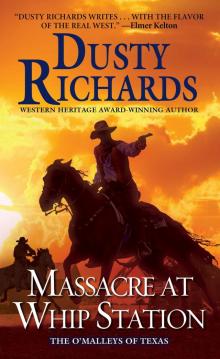 Massacre at Whip Station
Massacre at Whip Station Blue Roan Colt
Blue Roan Colt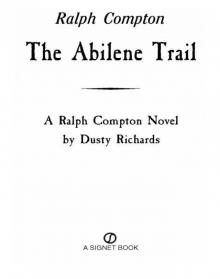 The Abilene Trail
The Abilene Trail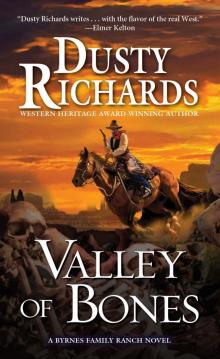 Valley of Bones
Valley of Bones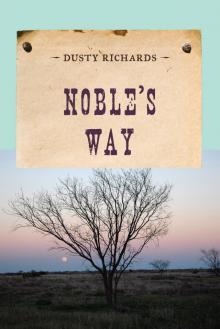 Noble's Way
Noble's Way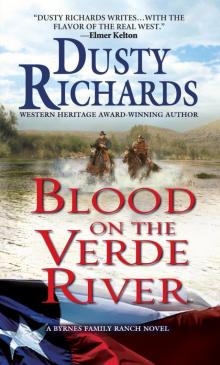 Blood on the Verde River
Blood on the Verde River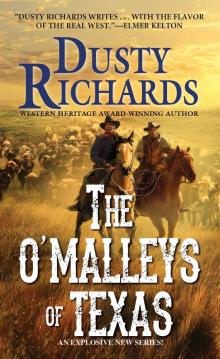 The O'Malleys of Texas
The O'Malleys of Texas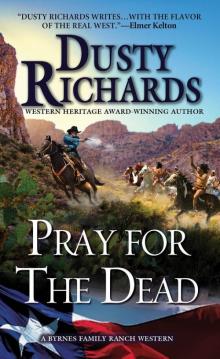 Pray for the Dead
Pray for the Dead Arizona Territory
Arizona Territory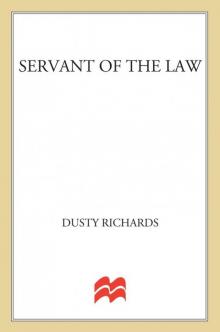 Servant of the Law
Servant of the Law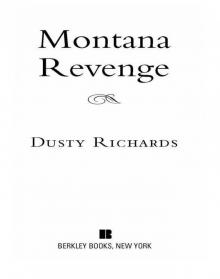 Montana Revenge
Montana Revenge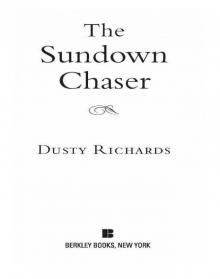 The Sundown Chaser
The Sundown Chaser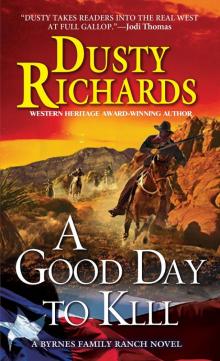 A Good Day To Kill
A Good Day To Kill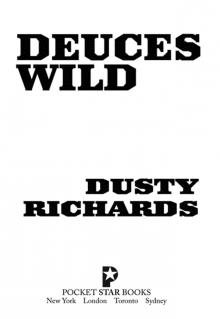 Deuces Wild
Deuces Wild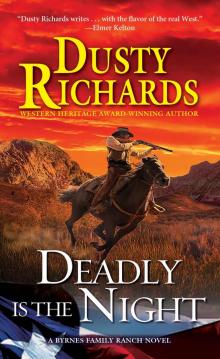 Deadly Is the Night
Deadly Is the Night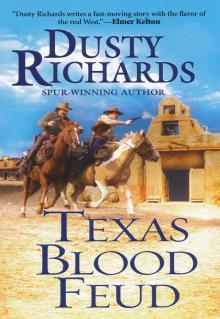 Texas Blood Feud
Texas Blood Feud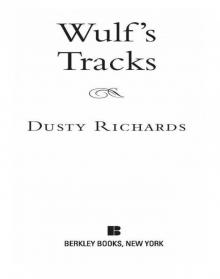 Wulf's Tracks
Wulf's Tracks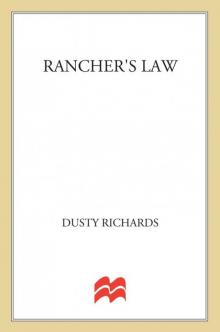 Rancher's Law
Rancher's Law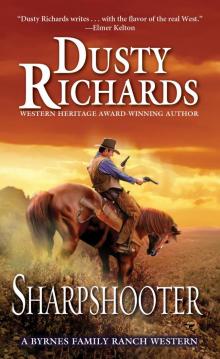 Sharpshooter
Sharpshooter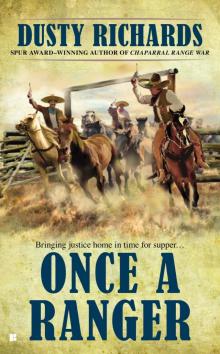 Once a Ranger
Once a Ranger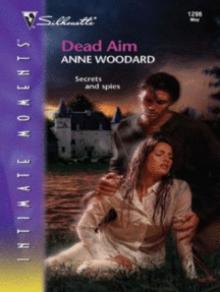 Dead Aim
Dead Aim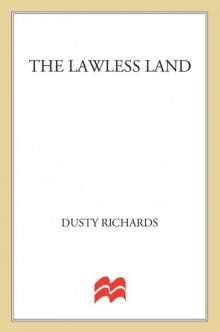 Lawless Land
Lawless Land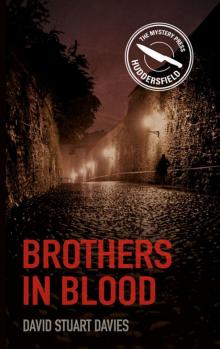 Brothers in Blood
Brothers in Blood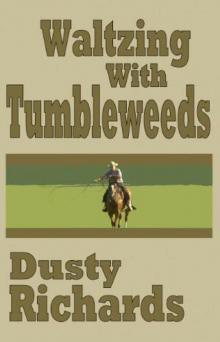 Waltzing With Tumbleweeds
Waltzing With Tumbleweeds